
The Congress of the Dominican Republic is the bicameral legislature of the government of the Dominican Republic, consisting of two houses, the Senate and the Chamber of Deputies. Both senators and deputies are chosen through direct election. There are no term limits for either chamber.
Mariano Lebrón Saviñón was a Dominican author of the 20th century. One of the founders of the second private university in the Dominican Republic, he named it the Universidad Nacional Pedro Henríquez Ureña, also writing its anthem. He was born on August 3, 1922 in Santo Domingo, the son of a Spanish immigrant, José Lebrón Morales, and a Dominican mother, Rosa Cándida Saviñón Pérez, of Canarian descent. He attended primary and secondary education in Santo Domingo. He received his medical degree at the University of Santo Domingo in 1946, and in 1949 in Buenos Aires, Argentina.
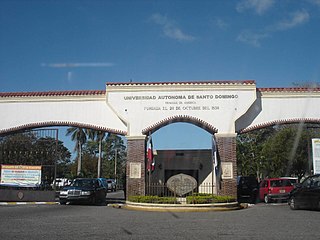
The Universidad Autónoma de Santo Domingo (UASD) is the public university system in the Dominican Republic with its flagship campus in the Ciudad Universitaria neighborhood of Santo Domingo and with regional campuses in many cities of the Republic. It was founded by Jose Gabriel Garcia and Emiliano Tejera in 1866 as the Professional Institute, replacing the former Universidad Santo Tomás de Aquino, one of the first universities of the Western Hemisphere (Americas), which was founded unofficially by a Papal bull in 1538, officially by royal decree in 1558, and closed in 1822. It was later renamed University of Santo Domingo in 1914.

Salomé Ureña was a Dominican poet and an early proponent of women's higher education in the Dominican Republic.
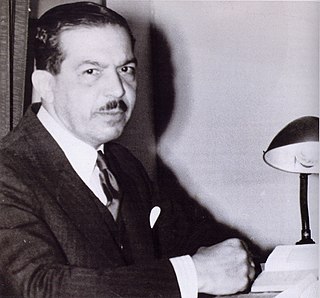
Pedro Henríquez Ureña was a Dominican essayist, philosopher, humanist, philologist and literary critic.
Señorita República Dominicana 1974 was held on February 2, 1974. There were 28 candidates who competed for the national crown. The winner represented the Dominican Republic at the Miss Universe 1974. The Virreina al Miss Mundo will enter Miss World 1974. Only the 27 province, 1 municipality entered. On the top 10 they showed their evening gown and answered questions so they could go to the top 5. In the top 5 they would answer more questions.
Dominican Republic literature has a long and interesting history.
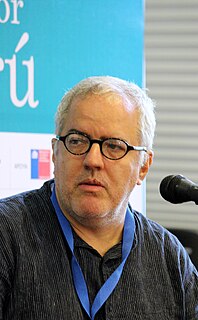
Miguel D. Mena is a Dominican writer, poet, essayist and publisher. He studied sociology in the Autonomous University of Santo Domingo, where he graduated in 1986 with the thesis Ciudad, espacio y poder en Republica Dominicanca. He continued his research on the city of Santo Domingo in Germany, where he has been living since 1990. His PhD from the Free University of Berlin has been recently published under the title: Iglesia, Espacio y Poder: Santo Domingo (1498–1521) Experiencia Fundacional del Nuevo Mundo. He has also written a collections of essays about the urban cuestion in the Dominican Republic and hundred of articles for newspapers and magazines about contemporary aspects of the Dominican capital. He has also written extensively about Dominican literature and especially about Vanguardism in the Dominican literature. He has been one of the leading figures in independent publishing since the mid-1980s in Dominican Republic. He is now at the head of “Cielonaranja Ediciones”
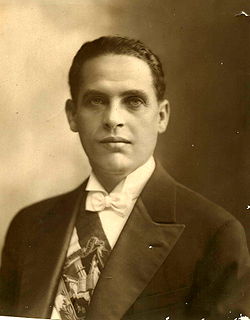
Juan Rafael Estrella Ureña was a Dominican politician and lawyer. He served as the last acting president of the Dominican Republic from March 3, 1930 until August 16, 1930, when he started to serve as the vice president under Rafael Leónidas Trujillo.

The National Pantheon was built from 1714 to 1746 by the Spaniard Geronimo Quezada y Garçon and was originally a Jesuit church. The structure was constructed in the neoclassic-renaissance style. Today, the structure stands as a national symbol of the Dominican Republic and serves as the final resting place of the Republic's most honored citizens.
Juan Isidro Jimenes Grullón was a Dominican essayist, historian, physician, philosopher, educator and politician.

Miguel Octavio Vargas Maldonado is a Dominican civil engineer, businessman, and politician. He is the current chairman of the Dominican Revolutionary Party, and former Minister of Foreign Affairs.
Camila Henríquez Ureña, was a writer, essayist, educator and literary critic from the Dominican Republic who became a naturalized Cuban citizen. She descended from a family of writers, thinkers and educators; both her parents, Francisco Henríquez y Carvajal and Salomé Ureña, as well as her brothers Pedro and Max, were literary luminaries. Her essays have been published in Instrucción Pública, Ultra, Archipiélago, Casa de las Américas, La Gaceta de Cuba, Revista de la Biblioteca Nacional, Revista de la Universidad de La Habana, and Revista Lyceum. A feminist and a humanist, she lectured during much of her career, advocating intellectual study for women.
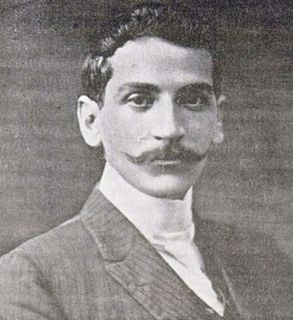
Luis Arístides Fiallo Cabral was an astronomer, medical laboratory scientist, physician, lawyer, architect, writer, philosopher and politician from the Dominican Republic.
Federico Henríquez y Carvajal was a writer, journalist and teacher from the Dominican Republic.
Andrés Luciano Mateo Martínez is a Dominican writer, novelist, poet, philologist, educator, literary critic, essayist, researcher and philosopher. He was the winner of the National Literature Prize in 2004.

José Gabriel García was a Dominican military, historian, politician, journalist and publisher. He is regarded as a cultural pioneer as well as the "Father of Dominican History". He is the author of "Compendium of History of Santo Domingo" written in four volumes in 1867, 1887, 1900 and 1906 respectively and made numerous contributions in the fields of culture, literature and education.
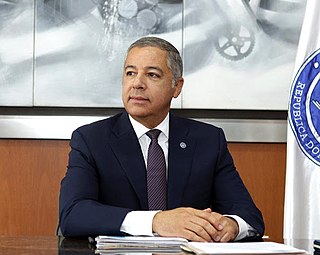
Donald Guerrero Ortíz is a Dominican businessman, economist, and professor. He was the Minister of Finance of the Dominican Republic from 2016 to 2020.











